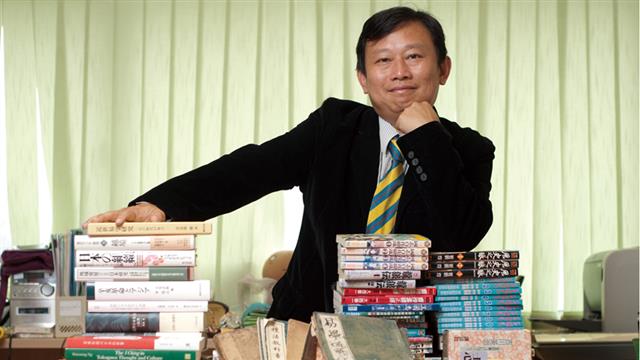Do you like manga (Japanese comics)?
I've been a keen reader of manga since I was young. I like manga that deal with historical topics because I'm a researcher of intellectual history. Manga that are deep and inspiring also appeal to me. Mushishi is a good one. For older ones, I like Teduka Osamu's works, which are very intellectual and philosophical. I also like those by Otomo Katsuhiro. Although they belong to the sci-fi genre, what they really talk about is human nature.
Is this also your research interest?
I have two research interests. One is intellectual history of Japan and Sino-Japanese cultural exchange. The other one is Japanese popular culture.
They seem to be poles apart.
To me, they're complementary. When I do research on popular culture, I benefit from my training in intellectual history. I tend to study popular culture the way I study intellectual history. When I study intellectual history and the history of cultural exchange, I borrow some concepts from the theories of popular culture, such as localization and hybridization.
How do you like doing research?
Research brings me a great sense of satisfaction. When I immerse myself in research, I feel as if I was removed from the present and have travelled back in time to Tokugawa Japan, interacting with people of the past. It feels wonderful.
Why are you especially interested in Tokugawa Japan?
As Chinese scholars, we have an edge over our Japanese counterparts in the research of this period. It is especially true for the area in which I'm interested—the intellectual exchange between China and Japan. We understand ancient texts as well as, if not better than, the Japanese. And we're familiar with Confucianism and Chinese philosophy. So, in this area, we do have the ability to outshine others.
In Japan's 2011 Tohoku Earthquake, we saw that the Japanese were law-abiding and self-disciplined people. But we also saw many irresponsible behaviours and cover-ups in the Tokyo Electric Power Company's handling of the nuclear crisis in Fukushima. How do you explain such a contradiction?
Japanese society is civic and tightly knit. Its people are decent and respectable citizens. In any other country, power outages and cut-off of water supply would definitely trigger riots. But it wouldn't happen in Japan. However, Japanese enterprises are a different story. As you can see in the TV drama Hanzawa Naoki, Japanese enterprises are riddled with problems like cover-ups, foul play, buck-passing, institutional corruption. Money politics is also a problem because these enterprises are closely intertwined with the government. As citizens, Japanese individuals are highly admirable. But Japanese enterprises are far from perfect.
Why did you establish your blog 'Nippon Heiya' in the first place?
I advocate an attitude in my blog: it's better to have an informed Japan watcher than a Japan hater. Mass media tend to produce sensational reports about events related to Japan. I'm not a very influential blogger. But at least I can provide an alternative voice, so that people can see Japan from a different angle.
Recently you haven't updated your blog as frequently as before. Why?
I've been writing mainly Facebook posts in the past six months. It's because Facebook is more interactive and I'm too busy to write blog articles, which are usually 500 to 1,000 words in length. Instead, a few sentences will do in a Facebook post. I don't want to lose contact with the outside world altogether because of my tight work schedule. So I stick to Facebook for the time being.
What are you busy with?
I have several books to publish. One is entitled China in Tokugawa Imagination, which has been finished and sent to the publisher. Another one is called Japanese Popular Culture and Hong Kong. I'll finish it and send it to the publisher by the end of this year. The third one is named The Popularization and Localization of the Yijing in Japan, Korea, Vietnam and the Ryukyu Kingdom, which is expected to be finished next year.


